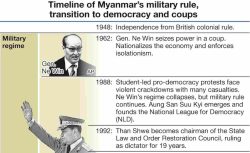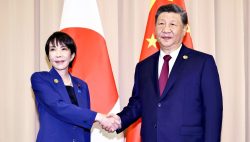LDP, Komeito’s Crushing Defeat in Lower House Election: Complacency Brought by Long Time in Power Led to Distrust / Stagnation in National Politics Must be Avoided
18:02 JST, October 28, 2024
The ruling bloc comprising the Liberal Democratic Party and Komeito suffered a crushing defeat in the House of Representatives election and fell short of a majority in the lower house.
Can the LDP-Komeito coalition stay in power with the cooperation of some opposition parties? Or will the opposition forces led by the Constitutional Democratic Party of Japan be able to bring about a change of government? The political situation has suddenly become fluid.
Another focal point is whether Prime Minister Shigeru Ishiba will decide to resign as he had set as the criteria for victory the LDP and Komeito together securing a majority in the lower house.
Political situation certain to become fluid
The ballots cast in the 50th lower house election have been counted.
The LDP and Komeito are facing headwinds that they have not experienced since returning to power in 2012. It can be said that the significant decline in their number of seats is an outcome, which reflects the public’s distrust in the complacency and laxity born of their being in power for a long time, symbolized by the problem of politics and money.
Conversely, many opposition parties increased their number of seats, but it remains unclear whether they can cooperate with each other because their principles and basic policies differ. The LDP-Komeito bloc and the CDPJ will likely each maneuver to forge a dominant force to secure a majority in the lower house.
Now that the forces of the ruling and opposition parties have become evenly matched, there are concerns that the tugs-of-war in debates on budget proposals and bills will intensify and delay the implementation of policies. In fact, during the administration of then Prime Minister Yasuo Fukuda from 2007 to 2008, opposition parties took control of managing Diet affairs and national politics was brought to a standstill.
Going forward, the ruling and opposition parties may engage in political maneuvering over the framework of the government, possibly prolonging the turmoil. Can the mountain of challenges at home and abroad be handled appropriately? Both the ruling and opposition parties now bear a great deal of responsibility.
This lower house race was marked by many unusual events. The Ishiba administration counted on the buoyant mood immediately after the establishment of Ishiba’s Cabinet and called for the dissolution of the lower house in the shortest time frame since the end of World War II.
However, as soon as the LDP was criticized for its policy of endorsing as party candidates all former lawmakers and others involved in a political funds scandal, it unendorsed candidates one after another, revealing the lack of a concrete vision.
In the final stage of campaigning, the LDP headquarters was found to have provided party branches headed by unendorsed candidates with ¥20 million, the same amount as for officially endorsed candidates, spreading confusion. This can only be described as a blunder on the part of party executives.
The LDP’s struggles could partly be chalked up to what was once called a rock-solid support base of conservative voters drifting away from the party.
Many such supporters were opposed to former Prime Minister Fumio Kishida last year suddenly steering a course toward enacting a law for the promotion of the understanding of LGBT sexual minorities and LDP presidential candidates discussing the legalization of a selective surname system for married couples.
Sanseito and the political group known as the Conservative Party of Japan, which have opposed these policies, have garnered a certain degree of support probably because they have succeeded in attracting conservative voters dissatisfied with the LDP. In some respects, distrust of the established parties has given momentum to these emerging forces.
Practical stances successful
Komeito, whose leadership changed last month for the first time in 15 years, also faced an uphill battle. The party’s new leader Keiichi Ishii, who vied for a single-seat constituency for the first time, failed to win, and this is believed to be affected by the aging of the members of the party’s support body Soka Gakkai.
On the other hand, the CDPJ gained seats partly due to its successful approach of making the LDP’s “reliance on money in politics” a point of contention.
CDPJ leader Yoshihiko Noda has expressed that, even if a change of government were to take place, he would largely maintain the current national security policy. Noda also stressed that he would not stick to the zero nuclear power policy set out in the party’s platform on nuclear power and other energy generation.
These practical stances appeared to have given voters a sense of reassurance.
The Democratic Party for the People also made great strides. DPFP leader Yuichiro Tamaki stressed increasing take-home pay and took a stance of placing importance on people’s lives, and such an approach probably helped expand voter support for the party, especially among the younger generation.
The Japan Innovation Party struggled in the election seemingly because of the impact of the construction costs for the 2025 Osaka-Kansai Expo venue, which have risen more than expected, and the harassment scandal of the former Hyogo Prefecture governor whom the party once endorsed.
Meanwhile, it is regrettable that policy debates did not deepen during the election campaign.
Don’t neglect challenges
The question of how to achieve sustained wage increases that outpace price hikes is a pressing issue. In addition, how can the social security system be structured more sustainably? Measures to deal with the rapid decline in the population also need to be taken urgently.
The international situation is changing drastically with the war in Ukraine and prolonged conflicts in the Middle East. As one of the Group of Seven industrialized countries, Japan should demonstrate its diplomatic capabilities and contribute to the stability of the international community.
The security environment around Japan is deteriorating like never before. In addition to strengthening defense capabilities, it is necessary to deepen the Japan-U.S. alliance and increase the number of friendly nations.
While it was inevitable that the issue of politics and money became the focus of the race, in part due to the opposition parties’ election tactics, a situation where tackling national issues is made light of must be avoided.
(From The Yomiuri Shimbun, Oct. 28, 2024)
Top Articles in Editorial & Columns
-

Myanmar Will Continue Under Military Rule Even After Election, Ex-Ambassador Maruyama Says in Exclusive Interview
-

40 Million Foreign Visitors to Japan: Urgent Measures Should Be Implemented to Tackle Overtourism
-

Expansion of New NISA: Devise Ways to Build up Household Assets
-

China Criticizes Sanae Takaichi, but China Itself Is to Blame for Worsening Relations with Japan
-

Withdrawal from International Organizations: U.S. Makes High-handed Move that Undermines Multilateral Cooperation
JN ACCESS RANKING
-

Univ. in Japan, Tokyo-Based Startup to Develop Satellite for Disaster Prevention Measures, Bears
-

JAL, ANA Cancel Flights During 3-day Holiday Weekend due to Blizzard
-

China Confirmed to Be Operating Drilling Vessel Near Japan-China Median Line
-

China Eyes Rare Earth Foothold in Malaysia to Maintain Dominance, Counter Japan, U.S.
-

Japan Institute to Use Domestic Commercial Optical Lattice Clock to Set Japan Standard Time



















